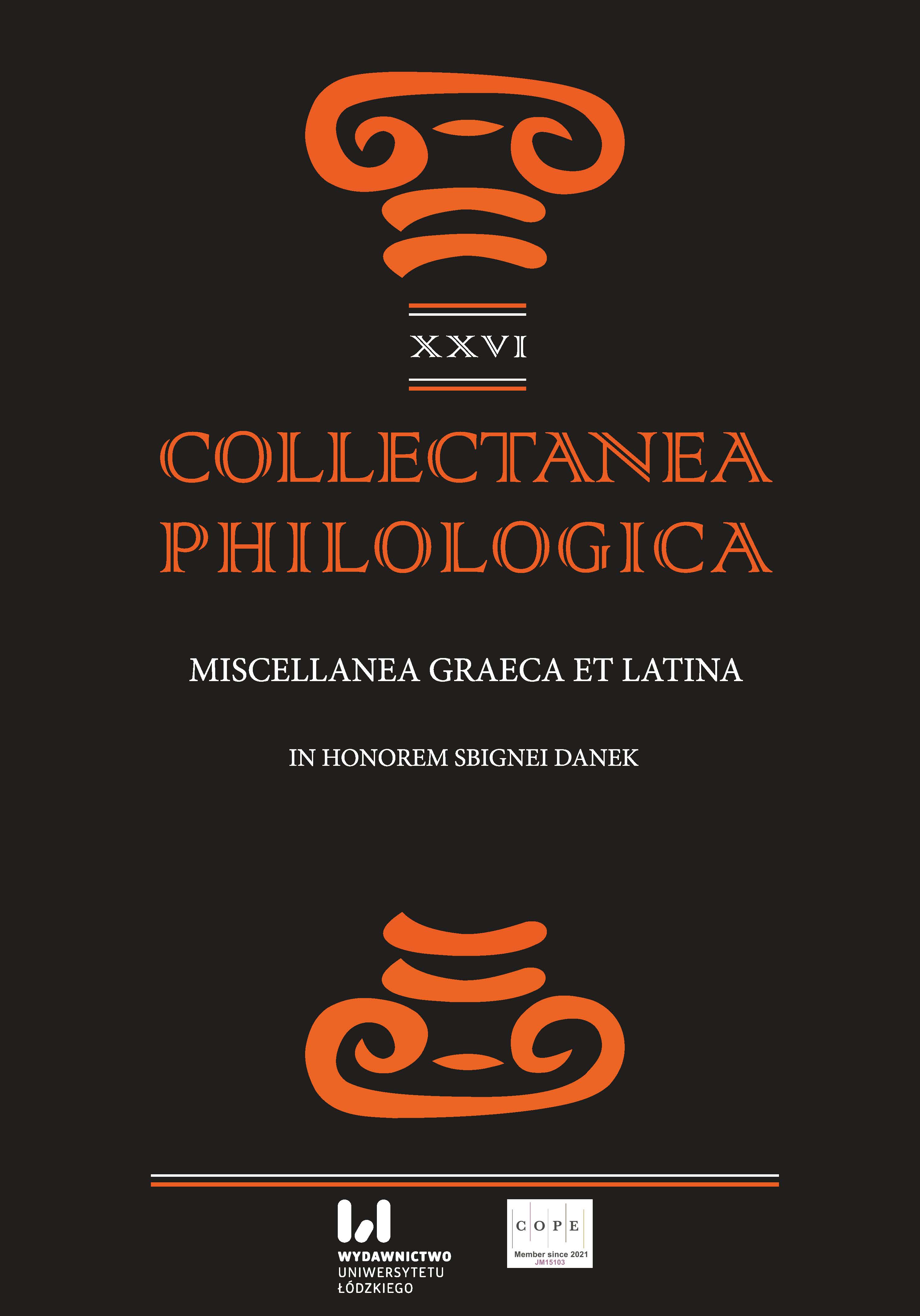Sofistyczna antylogika – wprowadzenie w problematykę
DOI:
https://doi.org/10.18778/1733-0319.26.03Słowa kluczowe:
filozofia starożytna, sofistyka, Protagoras, antylogikaAbstrakt
The article discusses the sophistic method of “antilogic” (“double arguments”, “contrasting arguments”, “opposed speeches”, “two-fold arguments”). The main goal is to show that it is a method that, in the light of the doctrine presented in Plato’s Theaetetus, is based on philosophical foundations. The work of G.B. Kerferd was crucial for the research on the art of antilogic, as it broke with the unequivocally negative understanding of this method adopted by the earlier research tradition. Late testimonies of Diogenes Laertius, Clement of Alexandria, Seneca and Eudoxus point to Protagoras of Abdera as the creator and promoter of the antilogic. These testimonies are confirmed by references to the method of “opposed speeches” contained in the comedies of Aristophanes, in the tragedies of Euripides and in the anonymous treatise Dialexeis. Plato’s report on the doctrine attributed to Protagoras in the Theaetetus reveals the philosophical context of the antilogic. The so-called “secret doctrine”, based on the acceptance of appearances and of the privacy of perceptions (man-measure doctrine), the rejection of truth and falsehood, and acceptance of the contradictory judgments results from the new vision of reality in flux. Therefore, the “secret doctrine” presents a consistent and coherent project leading to a new concept of logic and language and lays the foundations for the method of “double arguments”.
Bibliografia
Bartnik, C. (2008). Ogólna sofistyka dziś. https://www.radiomaryja.pl/bez-kategorii/ogolna-sofistyka-dzis/ [20.12.2022].
Google Scholar
Diels, H., Kranz, W. (1969). Die Fragmente der Vorsokratiker. Griechisch und Deutsch von Hermann Diels. Herausgegeben von Walther Kranz (13. wyd.). Berlin: Weidmann.
Google Scholar
Emsbach, M. (1980). Sophistik als Aufklärung: Untersuchungen zu Wissenschaftsbegriff und Geschichtsauffassung bei Protagoras. Würzburg: Königshausen & Neumann.
Google Scholar
Eurypides. (1980). Tragedie. Przeł. J. Łanowski. Warszawa: PIW.
Google Scholar
Gera, D.L. (2000). „Two thought experiments in the Dissoi logoi”. American Journal of Philology 121. 21–45.
Google Scholar
Gomperz, H. (1912). Sophistik und Rhetorik. Leipzig: Teubner.
Google Scholar
Hackforth, R. (1972). Plato’s Phaedo, Translated with an Introduction and Commentary by R. Hack-forth. Cambridge: Cambridge University Press.
Google Scholar
Kennedy, G.A. (1963). The Art of Persuasion in Greece. Princeton, New Jersey: Princeton University Press.
Google Scholar
Kerferd, G.B. (1981). The Sophistic Movement. Cambridge: Cambridge University Press.
Google Scholar
Kranz, W. (1976). Vorsokratisches IV. Die sogenannten Dissoi logoi. In: C.J. Classen (ed.). Sophistik. (Wege der Forschung, clxxxvii.) Darmstadt: Wissenschaftliche Buchgesellschaft. 223–232.
Google Scholar
Levi, A. (1940). „The ethical and social thought of Protagoras”. Mind 40. 284–302.
Google Scholar
Mendelson, M. (2002). Many Sides: A Protagorean Approach to the Theory, Practice and Pedagogy of Argument. Dordrecht, Boston, London: Springer.
Google Scholar
Mi-Kyoung, L. (2005). Epistemology after Protagoras: Responses to Relativism in Plato, Aristotle, and Democritus. Oxford: Oxford University Press.
Google Scholar
Nehamas, A. (1999). Eristic, Antilogic, Sophistic, Dialectic: Plato’s Demarcation of Philosophy from Sophistry. W: A. Nehamas. Virtues of Authenticity. Essays on Plato and Socrates. Princeton: Princeton University Press. 108–122.
Google Scholar
Nerczuk, Z. (2009). Miarą jest każdy z nas: Projekt zwolenników zmienności rzeczy w platońskim „Teajtecie” na tle myśli sofistycznej. Toruń: Wydawnictwo Naukowe Uniwersytetu Mikołaja Kopernika.
Google Scholar
Nerczuk, Z. (2010). Der Mensch als Mass aller Dinge. In: L. Jansen, Ch. Jedan (eds.). Philosophische Anthropologie in der Antike. Frankfurt: Ontos Verlag. 69–98.
Google Scholar
Nerczuk, Z. (2011). „Żywot Protagorasa u Diogenesa Laertiosa: („Żywoty i poglądy słynnych filozofów”, IX, 8)”. Studia Antyczne i Mediewistyczne 9. 51–64.
Google Scholar
Nerczuk, Z. (2012). „Metoda „dwu mów” w świetle świadectw przedplatońskich”. Studia Antyczne i Mediewistyczne 45(10). 37–50.
Google Scholar
Nerczuk, Z. (2016a). „Koncepcja „zwolenników zmienności” w Platońskim „Teajtecie” i jej recepcja w myśli greckiej”. Archiwum Historii Filozofii i Myśli Społecznej 61. 29–40.
Google Scholar
Nerczuk, Z. (2016b). Wokół sofistyki. Toruń: Wydawnictwo Naukowe Uniwersytetu Mikołaja Kopernika.
Google Scholar
Nerczuk, Z. (2019). „The philosophical basis of the method of antilogic”. Folia Philosophica 42. 5–19.
Google Scholar
Nerczuk, Z. (2020). Protagoras i antylogika. W: J. Grygieńć (red.). Filozofia przeszłości, filozofia przyszłości: Księga dedykowana prof. Markowi N. Jakubowskiemu. Toruń: Wydawnictwo Naukowe Uniwersytetu Mikołaja Kopernika. 359–370.
Google Scholar
Nestle, W. (1940). Vom Mythos zum Logos (3. wyd.). Stuttgart: A. Kröner.
Google Scholar
Reale, G. (1993). Historia filozofii starożytnej. Od początków do Sokratesa (T. 1). Przeł. E.I. Zieliński. Lublin: Redakcja Wydawnictw Katolickiego Uniwersytetu Lubelskiego.
Google Scholar
Schiappa, E. (2003). Protagoras and Logos: A Study in Greek Philosophy and Rhetoric. Columbia (South Carolina): The University of South Carolina Press.
Google Scholar
Seneca, L.A. (1964). Listy moralne do Lucyliusza. Przeł. W. Kornatowski. Warszawa: PWN.
Google Scholar
Striker, G. (1996). Methods of sophistry. In: G. Striker, Essays on Hellenistic Epistemology and Ethics. Cambridge: Cambridge University Press. 3–21.
Google Scholar
Tragicorum Graecorum Fragmenta. (1889). A. Nauck (ed.). Lipsiae: Teubner.
Google Scholar
Trieber, C. (1892). „Die Dialexeis“. Hermes 27. 210–248.
Google Scholar
Walters, F.D. (1994). Gorgias as Philosopher of Being: Epistemic Foundationalism in Sophistic Thought. Philosophy and Rhetoric 27(2). 143–155.
Google Scholar
Wróblewski, W. (1979). Pojęcie arete w II połowie V wieku p.n.e. Protagoras–Gorgiasz–Demokryt. Toruń: Wydawnictwo Naukowe UMK.
Google Scholar
Opublikowane
Wersje
- 2023-12-08 - (2)
- 2023-10-05 - (1)
Jak cytować
Numer
Dział
Licencja

Utwór dostępny jest na licencji Creative Commons Uznanie autorstwa – Użycie niekomercyjne – Bez utworów zależnych 4.0 Międzynarodowe.












